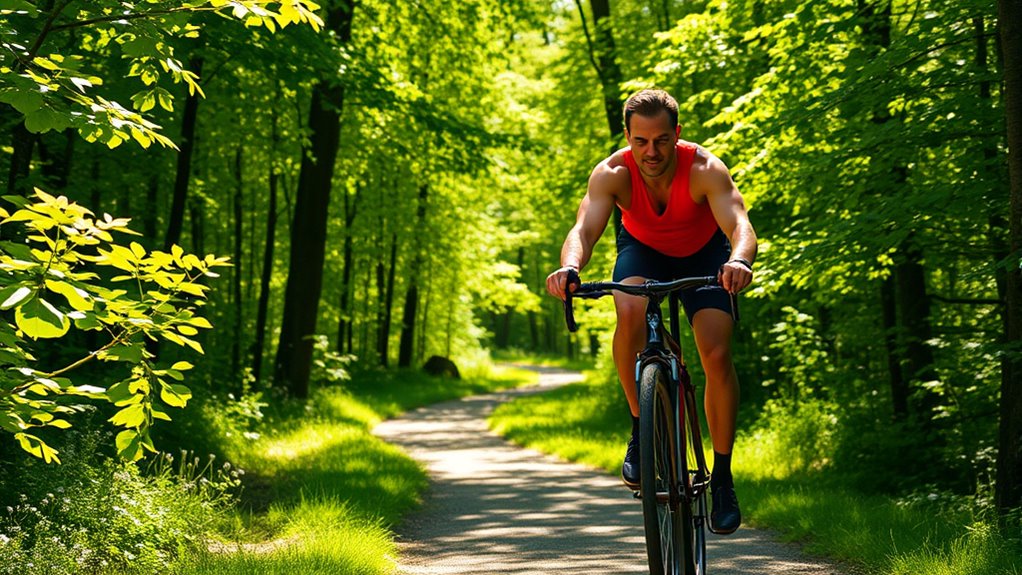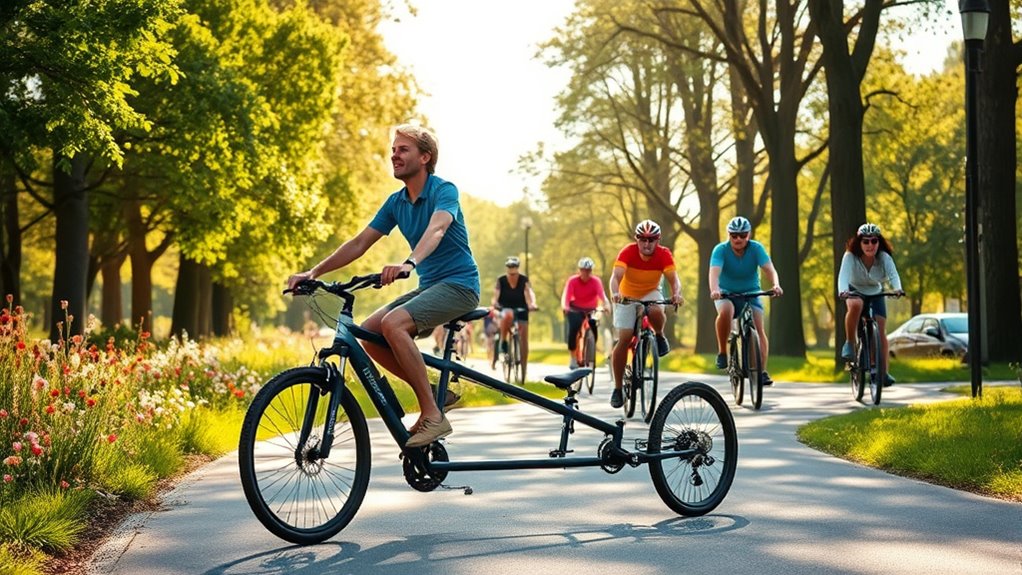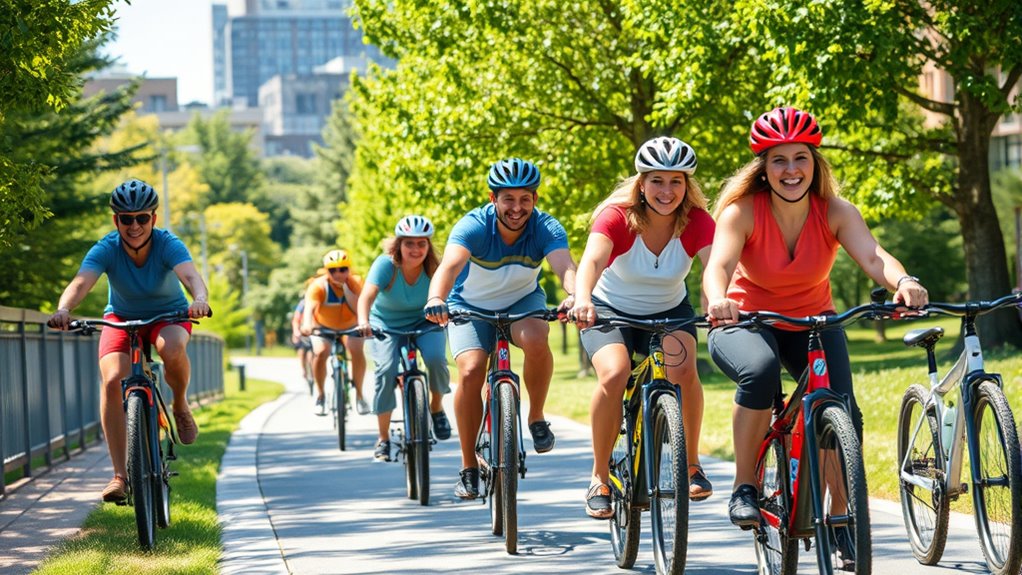Cycling boosts your mental resilience by releasing mood-enhancing neurochemicals like endorphins, serotonin, and dopamine, which improve your mood and reduce stress. Achieving biking milestones builds your confidence and sense of competence, while group rides foster social support and motivation. Regular cycling also helps reduce anxiety and depression, strengthening your emotional stability. As you make cycling part of your routine, you’ll discover how it transforms your mindset and resilience—there’s much more to explore ahead.
Key Takeaways
- Mastering cycling skills and achieving milestones boosts self-efficacy and belief in personal abilities.
- Regular outdoor rides foster resilience by overcoming physical and environmental challenges, increasing confidence.
- Social engagement through group rides builds trust, support networks, and collective problem-solving skills.
- Setting and reaching fitness goals enhances a sense of accomplishment, reinforcing mental resilience.
- Mindful cycling practices, like focusing on breathing and sensory awareness, promote emotional stability and mental clarity.
The Neurochemical Boost of Cycling for Mood Enhancement

Cycling triggers a surge of neurochemicals that elevate your mood and reduce stress. When you ride, your brain releases endorphins, natural painkillers that help you feel more relaxed and less anxious. Serotonin levels also increase, boosting your mood and supporting better sleep, especially helpful if you’re feeling mildly depressed. Additionally, cycling stimulates the production of neurotransmitters, which are essential for maintaining balanced mental health. Dopamine kicks in when you reach a goal, like completing a challenging ride, giving you a sense of accomplishment. Cycling also raises BDNF, a protein that repairs brain cells and sharpens memory. Additionally, it activates the endocannabinoid system, creating feelings of euphoria and relaxation. These neurochemical changes work together to lift your spirits, calm your mind, and reinforce your emotional resilience, making cycling a powerful tool for mental well-being. Engaging in regular riding can also improve overall brain health and mental health benefits, further supporting your mental clarity and confidence. Regular exercise like cycling enhances neurochemical production, which is essential for maintaining optimal mental functioning.
How Physical Achievement Fosters Self-Confidence

Achieving physical goals can substantially boost your self-confidence by demonstrating your capability and resilience. When you master cycling skills or reach fitness milestones, you reinforce your belief in your abilities. Regularly accomplishing these tasks enhances your sense of competence, which directly uplifts your self-esteem. Feeling stronger and more skilled translates into greater confidence in other areas of life. Success in physical activities also validates your effort, reducing insecurities and fostering resilience against setbacks. As you see tangible progress, your perception of personal effectiveness grows, creating a positive feedback loop that motivates you further. This process mirrors principles of mindful achievement that emphasize deliberate progress to build confidence. Whether improving your speed, endurance, or mastering a new route, each achievement affirms your potential, making you feel more capable and confident in facing challenges both on and off the bike.
Reducing Anxiety and Depression Through Regular Pedaling

Building on the confidence gained from physical accomplishments, regular pedaling can also considerably reduce anxiety and depression. Cycling lowers stress hormones like cortisol, helping you manage daily stress more effectively.
As you pedal regularly, your body releases endorphins, natural mood boosters that increase happiness and diminish feelings of anxiety. Cycling also improves sleep quality, which is essential for emotional stability.
Research shows that people who cycle to work often need fewer prescriptions for depression and anxiety, highlighting its mental health benefits. Additionally, cycling enhances cognitive functions, supports emotional well-being, and fosters a sense of achievement.
Over time, consistent riding becomes a routine that builds resilience, helping you better cope with life’s challenges while boosting overall mental health and emotional balance.
Building Resilience With Adaptive and Inclusive Cycling

Adaptive cycling empowers you to regain independence and control over your mobility, fostering resilience by enabling you to navigate your environment confidently.
Adaptive cycling restores independence and confidence, empowering you to navigate your world with resilience.
Engaging in low-impact exercise improves joint mobility and muscular strength, boosting your physical independence. It also develops motor skills like balance and coordination, which are essential for those with mobility challenges.
As you build stamina through cardiovascular improvements, you’ll find daily activities easier and less exhausting.
Adaptive tricycles offer stability, reducing the fear of falls and encouraging participation.
Mastering adapted equipment enhances your self-efficacy and problem-solving abilities, promoting a sense of achievement.
Participating in inclusive cycling events and group rides fosters social bonds and challenges stereotypes, reinforcing your identity beyond disability.
These innovations and experiences expand opportunities, empowering you to face life’s challenges with resilience and confidence. For example, the use of specialized adaptive equipment can further enhance comfort and safety during rides.]
An additional benefit is the availability of portable cycling accessories that enhance comfort and functionality during rides.
The Social Power of Group Rides and Community Engagement

Group rides and community engagement harness the collective strength of cyclists to foster mental resilience and social connection. Riding together offers peer encouragement, boosting your commitment through shared goals and challenges. Engaging regularly in group activities also encourages the development of safety awareness, which is vital for maintaining confidence and preventing accidents during rides.
Structured group dynamics facilitate mentorship, helping you learn from experienced riders and supporting newcomers. During rides, collective problem-solving builds trust and interdependence, while exposure to diverse perspectives introduces new techniques and mental coping strategies. Additionally, participating regularly in such activities can improve your sense of community belonging, which is crucial for emotional well-being.
Off-ride communication—forums and social events—strengthens bonds, enhancing your confidence on the bike. Regular group rides create consistency, turning cycling into a habitual resilience builder. Additionally, the sense of community experienced during these activities can significantly improve your emotional well-being and motivation.
Community events and milestone celebrations give you purpose and motivation, while role models demonstrate achievable progress. Overall, engaging with a cycling community amplifies your mental strength through shared experiences, support, and collective growth. Incorporating group cohesion into your routine further enhances the psychological benefits of riding together.
Practical Strategies to Incorporate Cycling Into Daily Life

Incorporating cycling into your daily routine can boost mental resilience by turning riding into a consistent habit. Start with short, manageable trips—errands under 3 miles—and gradually increase ride length to avoid burnout. Choose flat, low-traffic routes initially to reduce barriers and make riding feel more accessible. Using low-light office plants like the Snake Plant or Peace Lily can create a calming environment at home or work, supporting your mental well-being as you develop your cycling routine. Schedule cycling sessions as non-negotiable appointments, tracking your progress with apps or calendars to celebrate small wins. Integrate cycling into existing routines, like biking part of your commute or running errands, and keep gear accessible to minimize friction. Use comfortable bikes, weather-appropriate accessories, and security measures. Leverage behavioral tactics like habit stacking, rewards, and visual cues to reinforce consistency. Follow a gradual progression plan, balancing high- and low-intensity rides, and schedule rest days to sustain your motivation and resilience.
Enhancing Cognitive Function and Emotional Stability

Cycling actively boosts your brain’s cognitive and emotional abilities, making it a powerful tool for mental resilience. When you cycle regularly, especially outdoors, you enhance your executive functions, like decision-making and problem-solving, which are essential for mental clarity.
Cycling increases brain activity and can even reverse signs of brain aging, keeping your mind sharp. It also boosts alertness and arousal, helping you stay focused and vigilant. Neuroplasticity is further supported by physical activity, contributing to adaptable and resilient neural pathways. Engaging in consistent physical activity like cycling also encourages the growth of new neural connections, further strengthening brain resilience. Additionally, the development of AI safety measures in technology underscores the importance of safeguarding complex systems, which can be metaphorically related to nurturing and protecting our neural networks.
Emotionally, cycling releases endorphins, lifting your mood and reducing stress. It builds self-esteem through achievements and offers calming, mindfulness-like benefits from repetitive motion.
Additionally, cycling promotes neuroplasticity and increases brain-derived neurotrophic factor (BDNF), supporting overall brain health and resilience against cognitive decline. This combination strengthens both your mind and emotional stability effectively. Enhancing mental health through regular cycling can lead to sustained improvements in overall well-being.
Overcoming Barriers: Making Cycling Accessible for All

Making cycling accessible for everyone requires addressing several infrastructure, policy, and social barriers that limit participation. Narrow cycle lanes often exclude non-standard cycles like hand-cycles, tandems, and cargo bikes, while physical barriers such as bollards and fences block access for adapted bicycles and mobility devices.
Inclusive cycling requires overcoming physical barriers like narrow lanes and obstructions for all mobility devices.
Hazards like potholes, steep thresholds, and sandy surfaces make navigation dangerous. Without protected bike lanes, vulnerable riders face safety risks. Policies frequently lack recognition of cycling as a mobility aid, leaving inclusive infrastructure undervalued. Additionally, digital literacy initiatives can help promote awareness and understanding of adaptive cycling options.
Furthermore, the lack of specialized cycling infrastructure tailored to diverse needs discourages many potential riders from participating. Social barriers, including safety concerns and limited access points, discourage use among vulnerable groups. Funding and maintenance gaps further hinder accessibility, especially for adaptive and cargo cycles.
Overcoming these obstacles requires collaborative efforts to create inclusive designs, enforce supportive policies, and foster awareness—making cycling truly accessible for all. Improving cycling infrastructure and ensuring consistent maintenance are critical to building confidence and safety for all riders. Recognizing the importance of proper installation and safety standards can significantly reduce accidents and enhance user trust.
The Long-Term Impact of Cycling on Mental Wellness

Long-term cycling offers profound benefits for mental wellness that extend beyond immediate mood boosts. Regular riding improves cardiovascular fitness, which boosts overall physical health and positively influences your mental state. It also enhances muscle strength, fostering a sense of physical capability and control. Incorporating consistent cycling can also support mental resilience, helping individuals better cope with stress and challenges. Managing weight through cycling lowers the risk of depression and anxiety linked to health issues. The physical activity promotes better sleep, vital for mental stability. Additionally, cycling benefits gut health, connected to mood regulation via the gut-brain axis. Recognizing the importance of empathy in relationships, cycling can also serve as a social activity that fosters social connections and emotional support. Over time, these physical improvements lead to increased resilience, reduced depression and anxiety symptoms, and sharper cognitive function. Achieving cycling milestones and embracing outdoor adventures boost your self-esteem and confidence, creating a sustainable routine that supports your long-term mental wellness.
Cultivating Mindfulness and Presence During Your Ride

Practicing mindfulness and presence during your ride transforms a routine activity into a powerful tool for mental resilience. Focus on your breath by slowing it from 15 to 6-8 breaths per minute, coordinating each inhale and exhale with pedal strokes to create a calming rhythm. Use nasal breathing to improve oxygen efficiency and reduce exertion, especially during climbs or sprints.
Incorporate box breathing (4-4-4-4) during high-intensity moments to manage anxiety. Pay close attention to sensory inputs—the wind, terrain sounds, or pedal cadence—keeping your mind anchored in the present. Observe physical sensations non-judgmentally, such as muscle tension or fatigue, to lower pain perception.
This focused awareness fosters mental clarity, reduces stress, and enhances your overall resilience during every ride.
Frequently Asked Questions
How Quickly Can I Expect Mental Health Benefits From Cycling?
You might notice some mental health benefits pretty quickly after your first ride. Endorphins kick in within minutes, boosting your mood and reducing stress immediately.
You’ll likely feel more energized and focused within 10-15 minutes.
With regular cycling, mood stabilization and better sleep can develop within days to weeks, while confidence and emotional regulation improve over one to three months.
Stick with it, and you’ll see long-term mental health gains.
Is Cycling Effective for Managing Severe Anxiety or Depression?
Cycling can be effective for managing severe anxiety and depression. You’ll likely see improvements with regular, structured sessions—aim for at least three 45-minute rides weekly.
The exercise increases neuroplasticity and reduces inflammation, which helps mood disorders. It works well alongside therapy or medication and improves cognitive function.
Consistency is key; longer programs over 12 weeks tend to produce better results, especially when tailored to your fitness level and symptoms.
What Safety Precautions Support Mental Well-Being During Cycling?
You should prioritize safety precautions that boost your mental well-being while cycling. Wear reflective clothing and proper protective gear to feel secure and reduce anxiety.
Familiarize yourself with the roads and traffic rules to build confidence.
Use lights for visibility in low light, and choose safe routes with bike lanes or natural surroundings.
Riding in groups or with friends can also enhance your mood and reduce feelings of isolation.
Can Cycling Improve Mental Health in Older Adults?
Imagine yourself pedaling along a sunlit trail, feeling the breeze and vibrant surroundings. This simple act can boost your mental health, especially as you age. Cycling improves mood, reduces stress, and enhances cognitive function.
Regular outdoor rides, even on an e-bike, keep your mind sharp and spirits high. You’ll find yourself more confident, relaxed, and connected to your environment, making cycling a powerful tool for mental well-being in older adults.
How Do I Stay Motivated to Cycle Regularly for Mental Resilience?
To stay motivated to cycle regularly, set clear and achievable goals that inspire you.
Join a cycling community for social support and accountability.
Mix up your routes and challenges to keep things fresh.
Practice mindful breathing and positive self-talk to boost your mental resilience.
Celebrate your milestones, log your progress, and develop routines that make cycling a rewarding habit.
Conclusion
Just like Odysseus faced countless challenges and emerged stronger, your cycling journey can boost resilience and confidence. Each pedal stroke not only fuels your body but also rewires your mind, transforming struggles into strength. Embrace the ride as a path to self-discovery and emotional balance. Remember, every turn of the wheel brings you closer to a more resilient, confident you—ready to conquer life’s adventures with the same courage as those legendary explorers.









